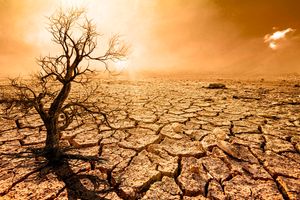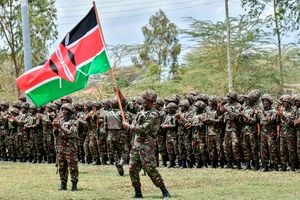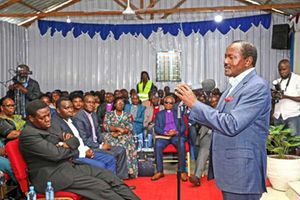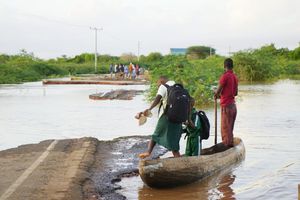Why Africa’s adaptation battle fell short at COP28
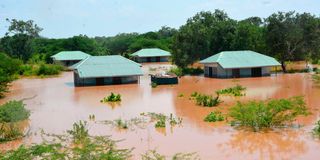
Houses marooned by floods in Garsen, Tana River County as floods continue causing havoc in this photo taken on December 3, 2023.
What you need to know:
- As floods rage across Malawi, South Africa and the DRC in early 2024, Africa’s resilience hangs by a thread. The continent is enduring the brunt of the climate crisis it did not cause.
- Africa cannot scale adaptation action without adequate, reliable, and fair finance.
In 2023, extreme weather events tore across Africa, killing 15,000 people and affecting 34 million others.
From floods to severe droughts and cyclones, our continent is no stranger to climate-induced devastation, with women, youth, smallholder farmers and indigenous people being some of the most vulnerable groups whenever these deadly weather events strike.
With Africa’s climate death toll rising, ambitious outcomes for adaptation could not be more urgent. Before last year’s annual climate conference, African stakeholders had critical expectations for COP28 to deliver an ambitious and just framework for the Global Goal on Adaptation.
Although COP28 established the global goal for adaptation, the overall outcome is a mixed bag that matches neither the urgency nor the gravity of adaptation for developing countries. This is a matter of life or death for Africans.
So, what is the Global Goal on Adaptation and why does it matter?
A strong framework for the Global Goal on Adaptation (GGA) is meant to serve as a North Star – a guiding light for more ambitious action and finance. Yet the fact that adaptation, specifically the Global Goal on Adaptation, is the second and equally important goal in the Paris Agreement, established by Article 7.1, is often overlooked.
The adaptation goal aims to boost farmers’ access to early warning systems or climate information to strengthen their ability to respond effectively to extreme weather events. It also reduces their vulnerability (extent to which they are affected) by climate impacts while contributing to sustainable development, in keeping with the 1.5-degree temperature goal.
By strengthening their adaptive capacity, we harness the ability of our communities’ socioecological and economic systems to adjust in response to actual or expected climate impacts and their effects.
Elevating adaptation to being on par with mitigation through the GGA is crucial for the Global South, particularly Africa whose unique circumstances place it as a highly vulnerable region to climate impacts.
In fact, it was the African Group of Negotiators (AGN) that first proposed the GGA in 2013. They also ensured its inclusion in the Paris Agreement. The AGN represents and negotiates on behalf of African countries during climate events.
However, since Paris, adaptation received minimal attention until the Africa Group reinvigorated the adaptation agenda by successfully proposing and having the two-year Glasgow Sharm-El Sheikh Work Programme adopted at COP26 in 2021.
COP28 – A missed opportunity for adaptation
Africa’s expectations, both from the Africa Group, civil society and many other stakeholders, were for COP28 to establish a robust framework for the GGA, ensuring clear, measurable targets aligned with the 1.5°C goal.
Another top priority for African stakeholders, along with many others from the Global South, was for the COP28 text to include an explicit recognition of developed nations' support for means of implementation. That is the need to scale up finance, technology transfer, and capacity building in developing countries. Despite significant steps forward on fossil fuels and the establishment of the Loss and Damage fund, the COP28 outcome for adaptation failed to live up to the expectations of many civil society and grassroots groups, especially from Africa.
The disappointing outcome is hardly a surprise considering negotiations on the GGA began on a negative note, as the initial draft negotiating text only surfaced five days into the event. Sharp divisions emerged between developed and developing nations, with unresolved geopolitical differences on crucial matters like finance and support for implementation, and the choice between quantitative and qualitative measures to gauge progress in adaptation.
Although the final text establishes the UAE framework for Global Climate Resilience in relation to the Global Goal on Adaptation, many of the priorities for Africa are either noticeably absent or the language is incredibly weak.
For instance, explicit references to developed countries being responsible for providing adaptation finance or other means of implementation support were removed and replaced with a vague invitation for “continued and enhanced international support.”
Meanwhile, establishing a separate agenda item to continue discussing the GGA quantifiable targets for finance and other adaptation goals, and the equity principle of Common but Differentiated Responsibilities – Respective Capabilities were all excluded.
With no measurable and timebound targets, no concrete support for means of implementation, especially finance, or accountability, the framework is criticised for being toothless, ineffective and failing to establish adaptation as a North star on an equal footing to mitigation.
As a result, the course correction desperately needed, especially for adaptation, has not been secured.
In the aftermath of COP28, adaptation seems to have been treated as a mere bargaining chip and sacrificed in broader negotiations, with another plan created.
At COP28, rich nations who caused the climate emergency failed to take responsibility and adequately consider the priorities set by vulnerable nations and, effectively, left frontline communities to fend for themselves.
As floods rage across Malawi, South Africa and the DRC in early 2024, Africa’s resilience hangs by a thread. The continent is enduring the brunt of the climate crisis it did not cause. Africa cannot scale adaptation action without adequate, reliable, and fair finance.
In 2024, African stakeholders must champion and drive the adaptation agenda forward, prioritising crucial issues such as revisiting adaptation goals and indicators, setting measurable adaptation finance targets, and elevating Africa's debt crisis.
Amy is a senior adaptation and resilience policy advisor at Power Shift Africa
